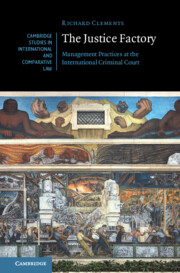Book contents
- The Justice Factory
- Cambridge Studies in International and Comparative Law: 182
- The Justice Factory
- Copyright page
- Contents
- Figures
- Acknowledgements
- Abbreviations
- 1 Introduction
- 2 A History of the International Criminal Court’s Managerial Present
- 3 The Managerial Court
- 4 The ICC Expert
- 5 ICC Legal Argumentation
- 6 ‘In a Technical and Political View’
- 7 Conclusion
- Select Bibliography
- Index
- Cambridge Studies in International and Comparative Law
5 - ICC Legal Argumentation
Meso-management
Published online by Cambridge University Press: 01 December 2023
- The Justice Factory
- Cambridge Studies in International and Comparative Law: 182
- The Justice Factory
- Copyright page
- Contents
- Figures
- Acknowledgements
- Abbreviations
- 1 Introduction
- 2 A History of the International Criminal Court’s Managerial Present
- 3 The Managerial Court
- 4 The ICC Expert
- 5 ICC Legal Argumentation
- 6 ‘In a Technical and Political View’
- 7 Conclusion
- Select Bibliography
- Index
- Cambridge Studies in International and Comparative Law
Summary
In 2019, ICC Pre-Trial Chamber II decided not to open an investigation into potential Taliban and US crimes in Afghanistan on the grounds that it would not be in the ‘interests of justice’. In arriving at this conclusion, the judges relied upon management concerns about organisational sustainability and the proposed use of resources to justify their position. While heavily criticised by scholars at the time, the judges’ reasoning alludes to the pervasiveness of management ideas and reasoning throughout the court, even in the realm of legal argumentation. This chapter takes the Afghanistan decision as the starting point for a discussion on management’s relationship to core argumentative dilemmas comprising the ICC legal field. Whether in framing case selection as a matter of court capacity or fashioning past obstacles to victim participation as ‘lessons learnt’, management ideas and practices enact a flight from the dilemmas and complexities of ICC-style justice by experts, deferring critique and sustaining the institutional project of global justice.
Keywords
- Type
- Chapter
- Information
- The Justice FactoryManagement Practices at the International Criminal Court, pp. 178 - 227Publisher: Cambridge University PressPrint publication year: 2024

